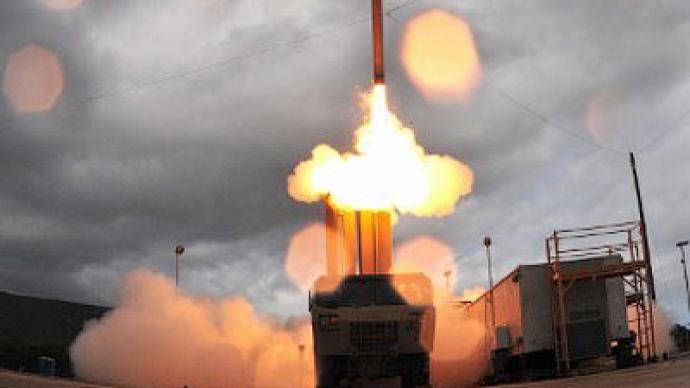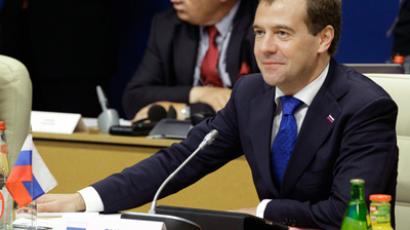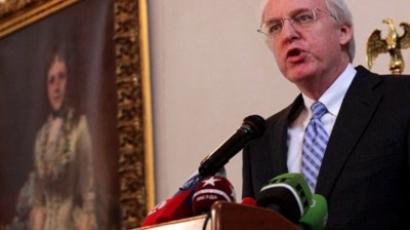Russia gets NATO ‘nyet’ on missile defense

NATO officials say they are willing to “cooperate” with Russia in the US missile defense system, while balking on the possibility of building a single system.
Unfortunately, NATO on Tuesday once again refrained from putting its money where its mouth is, offering Moscow cheap words, as opposed to priceless action when it comes to a genuine partnership in the construction of a European missile defense system, which the US says is needed to protect Europe from a 'rogue' missile strike. Russia was assured, once again, that the system was no cause for alarm. The US missile defense shield slated for Europe “does not pose any threats to Russia's defense capabilities,” James Appathurai, NATO's Deputy Assistant Secretary General, told his Russian hosts at a press conference in Moscow."The shield lacks the technical capabilities to disrupt Russia's potential to fend off a nuclear strike," he said, while failing to mention the system's potential for spatial and technological growth in the near future. As for providing written "legal guarantees" that the system – situated just miles from the Russian border – would not be aimed at Russian territory, Appathurai balked, saying they were not needed.The “ultimate guarantee” for Russia is to connect its system to NATO's, he said. When pushed for specifics, the NATO official only offered vague suggestions, like providing “data exchanges and coordination” between the two systems. Needless to say, the proposal did not sit well with Russia's Ambassador to NATO, Dmitry Rogozin."If Mr. Appathurai is really certain that technically the US missile defense cannot create impediments for Russian strategic nuclear forces, then what is the reason for the US refusal to put these guarantees on paper," he asked. At least providing legal guarantees is the only way to convince the parties of the seriousness of their intentions, Rogozin added.Moscow has said in the past that anything short of full cooperation in the developmental and operational stages of the system will be unacceptable. More than that, failure to come to terms could be the spark that ignites the next arms race."In the coming decade we face the following alternatives,” Russian President Dmitry Medvedev warned. “Either we reach agreement on missile defense and create a full-fledged joint mechanism of cooperation, or … a new round of the arms race will begin.”It is clear that this scenario would be very grave, Medvedev added.Thus far, however, few people in Europe – the very people who will be caught in the middle of any hypothetical arms race – seem to understand how serious Russia is about this system, and the threat it potentially poses to its national security.The NATO official, certainly aware of Moscow’s growing frustration with the stalled negotiation process, expressed hope that NATO and Russia would continue to cooperate if Prime Minister Vladimir Putin is elected president next year. Given the dubious level of cooperation thus far between the two sides, however, Appathurai may be in for a bitter surprise.After all, it was Putin in Feb. 2007 who lectured NATO in general and the United States in particular over the “almost uncontained hyper use of force – military force – in international relations, force that is plunging the world into an abyss of permanent conflicts.”“I think it is obvious that NATO expansion does not have any relation with the modernisation of the Alliance itself or with ensuring security in Europe,” Putin told fellow delegates at the Munich Security Meeting. “On the contrary, it represents a serious provocation that reduces the level of mutual trust.”Thus, it remains to be seen how NATO and Russia will continue their relations in the increasingly likely event of Putin being elected president next year. Appathurai said the formation of a single system – which apparently is not the same thing as "data exchanges and coordination" – is impossible since "NATO cannot entrust its security to third parties." NATO cannot go beyond these limits or cooperate with other partners, however strongly they may be trusted, he said, adding that the western military bloc has already made “serious concessions” to Russia.Appathurai succeeded in raising eyebrows even further with his announcement that Georgia and Ukraine will become members of NATO if they decide to implement the reforms which are in line with NATO standards. Exactly what those “standards” may be, especially given NATO’s track record of late, was not specified.In light of Russia’s experience with its less-than-predictable neighbors, Appathurai’s comments will not be well received. On August 7, 2008, for example, Georgia launched a major military offensive against Russian peacekeepers and civilians in Tskhinval, the capital of South Ossetia, thus sparking a 5-day war that culminated in a ceasefire agreement five days later. How Russia will respond to a hostile government being granted membership in an increasingly active military bloc is anybody's guess.Meanwhile, Ukraine, which has a lengthy lease agreement with Russia’s Black Sea Fleet, has been prone to severe political seizures, most recently with the imprisonment of Yulia Tymoshenko, the former Ukrainian prime minister who was found guilty of abuse of office and sentenced to seven years.Speaking on the situation in Libya, which just witnessed the death of former leader Muammar Gaddafi after he had been taken prisoner, the NATO Security General assured that the new Libyan authorities will not create an extremist Islamic state.The Libyan transition authorities have reassured us and the global community that the political process will proceed in strict accordance with the international law and human rights, he told the press conference at Interfax offices in Moscow.Meanwhile, NATO is not imposing “development paths” on any country, he added. Each country has the right to “democratically create its political system, its own laws, its own cultural values, and we respect that right,” he said. The “generally accepted principles of human rights” are very important for us, and we constantly remind our friends, in particular, Libya, about the need to respect them, Apparthurai said.Russia has expressed its concerns with the NATO military operation in Libya, which had been limited to the task of “protecting civilians,” saying that the military bloc exceeded its mandate,” basically siding with the anti-government forces.Robert Bridge, RT














